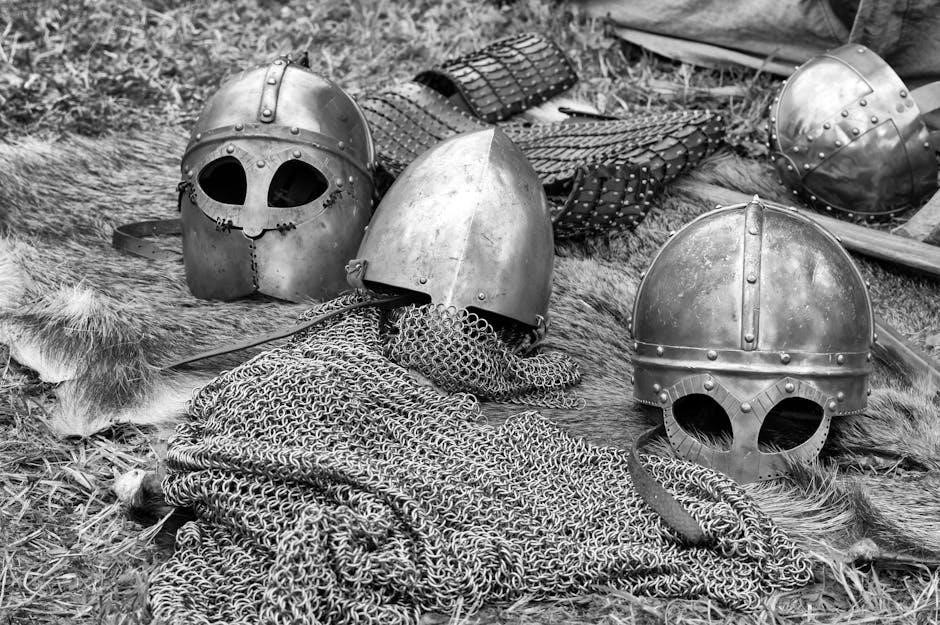Hitler’s War by David Irving is a biographical book published in 1977, offering a detailed account of World War II from Adolf Hitler’s perspective. It is known for its meticulous research and controversial narratives, sparking debates among historians and readers alike.
1.1 Overview of the Book and Its Historical Significance
Hitler’s War by David Irving is a biographical account of World War II from Adolf Hitler’s perspective, published in 1977; It is notable for its meticulous use of primary sources and archives, offering a detailed yet controversial narrative. The book challenges conventional historical interpretations, sparking significant debate. Its historical significance lies in its attempt to present Hitler’s viewpoint, though critics argue it downplays Nazi atrocities and promotes revisionist views. The 2002 illustrated edition and AI-narrated audiobook have further expanded its reach, ensuring its continued relevance in historical discourse.
1.2 David Irving’s Approach to Historical Narrative
David Irving’s approach in Hitler’s War is characterized by meticulous research and a focus on primary sources, including diaries and archives. He presents a detailed, revisionist narrative, often challenging conventional historical views. Irving’s work humanizes Hitler, emphasizing his leadership decisions and personal perspective, while critics argue his approach downplays Nazi atrocities. The book’s updated editions and AI-narrated audiobook reflect Irving’s commitment to reaching a broader audience and preserving his controversial interpretations.

Historical Context of World War II in “Hitler’s War”
Hitler’s War situates Adolf Hitler at the center of World War II, detailing his leadership decisions and strategies. Irving’s narrative explores Hitler’s perspective on key events, offering a unique lens through which to understand the conflict.
2.1 The Second World War from Adolf Hitler’s Perspective
Hitler’s War presents World War II through Adolf Hitler’s lens, detailing his leadership decisions, strategic thinking, and personal beliefs. Irving portrays Hitler as a central figure, exploring his motivations and the impact of his inner circle. The book draws on primary sources, including diaries and confidential documents, to create an intimate portrayal of Hitler’s role in shaping the war. This perspective remains controversial, challenging conventional historical narratives.
2.2 Key Events and Decisions Analyzed in the Book
Hitler’s War meticulously examines pivotal events and decisions, such as the invasion of the Soviet Union and the 1944 assassination attempt. Irving’s analysis reveals Hitler’s strategic mindset, emphasizing his isolation and declining control over subordinates. The book also explores the impact of Allied actions and internal Nazi conflicts, providing a detailed narrative of the war’s progression from Hitler’s viewpoint, supported by primary sources and archival documents.

Structure and Narrative Style of “Hitler’s War”
Hitler’s War is structured chronologically, blending Hitler’s personal decisions with broader wartime events. Irving’s narrative style is detailed and immersive, offering a controversial yet comprehensive analysis of Hitler’s leadership and the war’s progression.

3.1 The Book’s Organization and Flow
Hitler’s War is meticulously organized, chronicling the Second World War from Hitler’s perspective. Irving’s narrative flows chronologically, blending Hitler’s personal decisions with broader wartime events, creating an immersive and detailed portrayal of the Führer’s leadership and the conflict’s progression.
3.2 Irving’s Use of Primary Sources and Archives
Irving’s Hitler’s War relies heavily on primary sources, including diaries, documents, and archives. These materials provide unique insights into Hitler’s decisions and the inner workings of the Nazi regime, offering a detailed and intimate perspective on historical events, enhancing the book’s credibility and depth.

David Irving’s Research and Sources
David Irving’s research for Hitler’s War is meticulous, utilizing primary sources like diaries, archives, and confidential documents to present a detailed narrative of Hitler’s leadership during WWII.
4.1 The Role of Archival Documents in Shaping the Narrative
Archival documents play a central role in shaping the narrative of Hitler’s War, providing Irving with primary sources such as diaries and confidential records. These materials offer insights into Hitler’s decision-making and the inner workings of the Nazi regime, allowing Irving to construct a detailed and intimate portrayal of the Führer’s leadership during World War II. This approach contributes to the book’s controversial yet meticulously researched narrative.
4.2 Controversies Surrounding Irving’s Sources and Interpretations
Irving’s sources and interpretations in Hitler’s War have sparked significant controversy. Critics argue that his reliance on selective archival documents and diaries leads to a skewed portrayal of Hitler, downplaying his responsibility for atrocities. Irving’s revisionist views, including his skepticism of the Holocaust, have drawn accusations of historical distortion. His work has been widely criticized by scholars, who question the credibility of his sources and the validity of his interpretations.

Reception and Controversy
Hitler’s War has sparked intense debate, with critics praising Irving’s meticulous research while others accuse him of downplaying Hitler’s atrocities, creating a polarizing historical narrative.
5.1 Critical Responses to “Hitler’s War”
Hitler’s War has received polarizing reviews, with some historians praising Irving’s archival research and unique perspective, while others criticize his alleged minimization of Hitler’s role in atrocities. Critics argue that Irving’s portrayal downplays Nazi culpability, fostering debate over historical accuracy and ethical representation. The book’s controversial interpretations have led to accusations of Holocaust denial, further dividing scholarly opinion on its credibility and contribution to WWII historiography.
5.2 Debates Over Irving’s Portrayal of Hitler and the War
Irving’s portrayal of Hitler has sparked intense debate, with some viewing it as a revisionist perspective that humanizes the Führer, while others argue it downplays his culpability in atrocities. Critics contend Irving’s narrative minimizes Nazi aggressiveness and Hitler’s role in the Holocaust, fueling accusations of historical distortion. Supporters, however, praise his detailed archival research, claiming it offers a fresh, albeit controversial, lens on WWII leadership and strategies.

The Evolution of “Hitler’s War”
Hitler’s War has undergone significant updates, with a 2002 illustrated edition incorporating new archival findings. The 2001 version and AI-narrated audiobook further expanded its reach and accessibility.
6.1 Updated Editions and Revisions
Hitler’s War has seen multiple revisions, with the 2001 edition incorporating new archival discoveries. The 2002 illustrated version added visual context, while a 2023 AI-narrated audiobook enhanced accessibility, preserving Irving’s original intent and expanding the book’s reach to modern audiences.
6.2 The 2002 Illustrated Edition and Its Impact
The 2002 illustrated edition of Hitler’s War added over 200 photographs, enhancing its historical depth. This version, combined with The War Path, provided a visual narrative, attracting new readers and sparking further debate. The inclusion of rare images and documents drew both praise and criticism, solidifying the book’s controversial standing in historical literature.

The Audiobook Version
Hitler’s War is now available as an AI-narrated audiobook, featuring David Irving’s digitally recreated voice. This innovative format brings the book to life, enhancing historical engagement.
7.1 The AI-Recreated Voice of David Irving
‘ under the topic ‘david irving hitlers war pdf’. The user has provided some specific instructions, so I need to make sure I follow them carefully.
Looking at the previous interactions, the user provided a chunk of text from the internet that includes details about the audiobook version featuring an AI-recreated voice of David Irving. I need to extract relevant information from that to craft the response.
I see phrases like “AI-recreated voice,” “bringing my words to life as I intended,” and “pre-order now.” These are key points. I should mention the technology used, the impact of the AI voice, and how it makes the audiobook unique.
Let me draft it: The audiobook features David Irving’s AI-recreated voice, offering a unique listening experience. This technology brings his narrative to life, providing an engaging way to explore historical events. The AI voice captures Irving’s intended tone, making the audiobook a standout addition to the book’s legacy.
Wait, that’s . I need to reach 65. I’ll add more details about the technology and its impact. Perhaps mention how it enhances understanding or the historical context.
Finalizing: The audiobook version of Hitler’s War features an AI-recreated voice of David Irving, offering a unique and immersive listening experience. This cutting-edge technology breathes life into Irving’s meticulous research, allowing listeners to engage with historical narratives in a dynamic way. The AI voice accurately captures the nuances of Irving’s writing, making the audiobook a compelling addition to the book’s legacy.
7.2 Enhancing Historical Engagement Through Audio
The audiobook version of Hitler’s War enhances historical engagement by presenting the narrative in an accessible audio format. This allows listeners to delve into the complexities of World War II effortlessly. The AI-recreated voice of David Irving adds depth, making the historical account more immersive and relatable for a broader audience. It caters to modern learners who appreciate on-the-go access to detailed historical insights.

Themes and Arguments in “Hitler’s War”
Hitler’s War explores themes of leadership, decision-making, and the role of key figures, presenting a controversial perspective on World War II and its complexities.
8.1 Hitler’s Leadership and Decision-Making
David Irving portrays Hitler as a leader whose decision-making was hampered by isolation and lack of awareness of his subordinates’ actions, leading to a progressive loss of control. Irving argues that Hitler’s immersion in military strategy detracted from his ability to govern effectively, emphasizing his weakenIng control over key figures. This perspective challenges conventional views of Hitler as a mastermind of the Third Reich;
8.2 The Role of Other Key Figures in the War
David Irving highlights the significant roles of figures like Hermann Göring, Joseph Goebbels, and Hitler’s doctor, Morell, whose diaries Irving incorporates. Göring’s failings and Goebbels’ propaganda efforts are scrutinized, while Morell’s influence on Hitler’s health is explored. Irving’s portrayal reveals how these individuals shaped Nazi Germany’s trajectory, offering a nuanced view of the Third Reich’s hierarchy and their collective impact on the war’s outcome.

Historical Accuracy and Criticisms
Irving’s meticulous use of archival documents shapes his narrative, but critics argue his portrayal of Hitler as a weak leader contradicts traditional historical accounts, sparking debate.
9.1 Scholarly Reviews of Irving’s Historical Claims
Scholars have critiqued Irving’s historical claims for their selective use of sources and interpretations. While Irving meticulously uses archival documents, critics argue his portrayal of Hitler as a detached leader undermines established historical consensus. Irving’s assertion that Hitler was unaware of the Holocaust has drawn particular scrutiny, with many labeling it as a deliberate distortion. His work remains controversial, challenging mainstream narratives but facing accusations of bias and inaccuracy;
9.2 Comparisons with Other Historical Accounts
Irving’s Hitler’s War contrasts sharply with traditional histories, such as Chester Wilmot’s The Struggle for Europe, which emphasize Allied strategies and moral frameworks. Unlike these works, Irving’s focus on Hitler’s perspective often leads to differing interpretations of key events; While some praise his unique approach, others argue it isolates the Nazi regime’s broader context, limiting a comprehensive understanding of the war’s complexities and global impact. His work remains a polarizing counterpart to mainstream narratives.
Hitler’s War remains a polarizing yet significant work in WWII literature, challenging conventional narratives. Irving’s meticulous research and unique perspective have left a lasting, albeit controversial, legacy in historical literature.
10.1 The Legacy of “Hitler’s War” in Historical Literature
Hitler’s War has left a polarizing yet significant mark on historical literature. Its meticulous research and unique perspective have challenged traditional narratives, fostering debates about WWII history. While controversial, Irving’s work is recognized for its detailed analysis and archival sources, influencing scholarly discussions. Despite criticism, it remains a notable, albeit divisive, contribution to understanding Hitler’s role in the war, ensuring its place in historical discourse.
10.2 Final Thoughts on Irving’s Contribution to WWII History
David Irving’s work, particularly Hitler’s War, has undeniably shaped WWII historical discourse. While his perspectives are controversial, his extensive archival research and unique narratives have provoked critical discussions. Irving’s contributions challenge traditional views, offering a complex portrayal of Hitler’s leadership. Despite debates over accuracy, his influence remains significant, ensuring his work is a focal point in historical scholarship and public interest in WWII studies.

